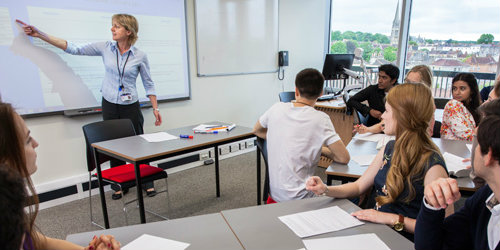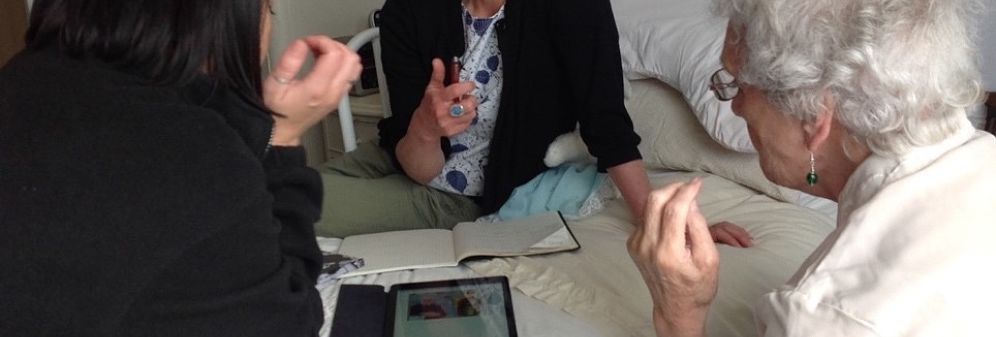Improving the quality of life of older people
Using objects and storytelling in care homes helps residents build social connections and improves their quality of life.
The challenge
Research suggests that older people are often bored and lonely in care home settings. Can new strategies be developed and co-produced with stakeholders to better improve the quality of life of older people living in care.
Research impact - Using Digital Tools to better support staff, families and residents to come together to record and share stories and memories
We are all familiar with the image of care homes - older people sitting around a sterile or overly fussy lounge room in wing backed chairs, TV blaring in the corner. Research suggests that older people are often bored and lonely in these situations.
Impact from the Tangible Memories research project has worked to change this culture and improve the quality of life of older people living in care. To encourage wider take-up of the research insights of those working to support older people, the research team developed a digital resource including a ‘Toolkit’ and a ‘Blueprint’ from the Parlours of Wonder research and a ‘StoryCreator’ app from the Tangible Memories research.
Impact was achieved through take-up of these digital tools and training resources that Alive activities now host on their website (the Parlours of Wonder Toolkit and Blueprint). These resources have been downloaded nearly nine hundred times and are being used by professionals including social workers, nurses, care managers and occupational therapists.
The findings, methods and tools developed through the project have been applied in many new settings, and increasing numbers of older people, care providers and communities have had the opportunity to benefit. Training delivered to over 2500 care home professionals across the South West has led to scaling-up of the intervention and raised the capacity of care home staff to support older residents’ quality of life.
The intervention methods and tools have also been embedded and developed as part of the practice of the charity Alive! and in over 50 care home settings nationally and increasingly internationally. Gill Roberts from Alive! said of the Tangible Memories sessions: “The effects I witnessed in these sessions were remarkable, particularly in terms of increased confidence and in the changed relationships between care staff and older people”. She also noted the project had impacted on the charity’s own training provision by “enhancing our training offering around life-story work, and we have included the Tangible Memories app in all trainings we provide for care home staff”.
The methods and practices developed during the research are also being independently applied in new settings.
- In 2017, Hanover Housing extended the Parlours of Wonder project to some of their estates in Gloucestershire. Rowena Hindle from Hanover Housing recalled the “unbelievable impact Tangible Memories has had” the “empowerment” of residents, and how “the project had brought back memories that they had now shared and recorded with their families”.
- Mears Care, who work in partnership with Hanover Housing, have integrated the approach into their ways of working by inviting the older people being cared for in the community into the Parlour of Wonder for sessions to improve their quality of life.
- Drawing on the potential of the StoryCreator app, Scarborough Museums ran a similar intergenerational project called Outside the Box in the North East. Emily Nelson, from Scarborough Museums Trust said “we are very excited to work alongside the Parlours of Wonder project through using and providing feedback on this wonderful app”.
The research has helped inform national policy debates around loneliness. The research was presented at a parliamentary event ‘Loneliness across the Lifecourse’ in July 2018. An audience of policy makers including the chair of the All-Party Parliamentary Group on Loneliness, funders, health professionals, community activists and third sector organisations discussed how they might respond to the issue of loneliness raised by the research.
Underpinning research
The Tangible Memories research project funded by AHRC explored how cherished and everyday objects might support residents to build better social connections through story telling.
The research led by Dr Helen Manchester and in collaboration with computer scientists, historians, a charity (Alive activities) and artists (Heidi Hinder) and designers (Stand + Stare), involved the co-design of a set of new digital tools, using cutting edge tangible technologies that aimed to enhance democratic community building and engage residents in multisensory experiences.
We discovered that our co-design methods using storytelling, objects and multisensory approaches did improve the quality of life of older people, resulting in a decrease in social isolation and loneliness in the care settings in which we worked. During the research and co-design process we also discovered that sustaining the activities was very challenging, due to lack of funding, training and the right access to different kinds of spaces for care staff to deliver storytelling sessions.
To meet this need, we co-developed with care staff, the Tangible Memories: Parlours of Wonder intervention. A Parlour of Wonder is a new space of discovery, connection and meaning making in care home settings designed with older people living in care homes to enable them to share stories and enjoy multigenerational relationships. The aim is to improve the quality of life of older people but also, through the multigenerational activities, to bring school children and older people together to challenge assumptions about and representations of older people.
The project developed a methodology for co-designing technologies to enable staff, families and residents to come together to record and share stories about objects. A set of digital prototypes were also co-designed with residents, these included an Interactive rocking chair, an innovative new design called TopoTiles, plus a StoryCreator app now available on the App store.
Researcher
Other University of Bristol researchers involved
Related research groups
Centre for Comparative and International Research in Education (CIRE)
Publications
- Manchester, H. (2018) ‘Objects of Loss: Resilience and Continuity in Material Culture Relationships’ in Newman’, in Goulding, A., Davenport B., and Newman, A. (2018) Creative Practice in the Resilience of Older People. Bristol: Policy Press (Connected Communities Series)
- Manchester, H. and Barke, J. (with the Productive Margins Collective). ‘Regulating for careful knowledge production: Researching older people, isolation and loneliness’ in McDermont, M., Cole, T., Piccini, A. (2020) Imagining Regulation Differently: co-creating regulation for engagement. Bristol: Policy Press.
Date published
September 2020
 Study Education
Study Education
Join us in improving educational environments for future generations




2.png)
